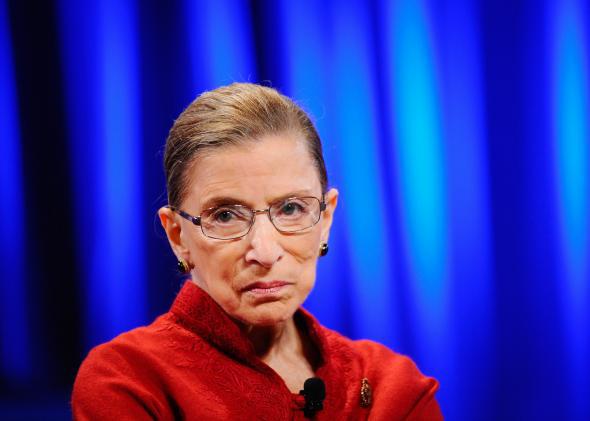On Sunday, Justice Ruth Bader Ginsburg presided over the marriage of Michael Kahn, artistic director of the Shakespeare Theater Company, and his longtime partner, Charles Mitchem. Because Ginsburg is both a friend of the queer community and a friend of the Shakespeare Theater Company, her role in the Kahn-Mitchem wedding was predictable. But, as Maureen Dowd noted in a winking New York Times report, the justice had a surprise up her sleeve:
With a sly look and special emphasis on the word “Constitution,” Justice Ginsburg said that she was pronouncing the two men married by the powers vested in her by the Constitution of the United States. No one was sure if she was emphasizing her own beliefs or giving a hint to the outcome of the case the Supreme Court is considering whether to decide if same-sex marriage is constitutional. But the guests began applauding loudly, delighted either way.
Was Ginsburg’s emphasis on the word “Constitution” really an implication that the Supreme Court will soon rule in favor of nationwide marriage equality? That seems to be an awfully big leap—but a number of outlets, including Time and Breitbart, quickly ran with the inference. By Monday, the National Review’s Ed Whelan grabbed ahold of the news and penned an acidic attack on Ginsburg, asserting that that “in violation of that obligation of impartiality, she has instead signaled at every turn how she will vote in the pending marriage cases and how she expects the Court’s majority to vote.”
Whelan, a former clerk of Justice Antonin Scalia, was once a brilliant conservative commentator—but the rise of marriage equality has melted his once-sharp prose into bitter bluster. Case in point: Whelan uses Ginsburg’s verbal accentuation to further his claim that she must recuse herself from the marriage cases. And, if she doesn’t, Whelan declares that “no one should be expected to regard as legitimate a Supreme Court decision inventing a constitutional right to same-sex marriage.”
I find Whelan’s edict here doubly puzzling. Ginsburg certainly isn’t the only justice to express her constitutional beliefs off the bench: During an anti-abortion rally this January, Justice Clarence Thomas met with two vehemently anti-LGBTQ, anti-abortion activists and took a picture with them at the court. Thomas complimented one of the activists on his anti-abortion tie. By Whelan’s logic, Thomas should probably recuse himself from the same-sex marriage cases, and he should certainly recuse himself from any future abortion rights cases. Like Ginsburg, Thomas has expressed rather vague support for a constitutional cause. If Whelan had any intellectual consistency in this arena, he’d have to condemn both Ginsburg and Thomas to the dugout. Instead, he only picks on Ginsburg. I can’t imagine why.
But what’s even stranger about Whelan’s castigation is his off-handed assertion that “no one should be expected to regard” a pro-marriage Supreme Court ruling as “legitimate.” The National Review has been publishing a lot of goofy stuff lately about rejecting judicial supremacy, mostly in anticipation of June’s marriage equality ruling. And while I would welcome a serious conversation about the anti-democratic threat of an all-powerful Supreme Court, the National Review’s stable of decreasingly rational conservatives really only seem interested in letting states nullify rulings they don’t like. I assume, for instance, that while Whelan and his cohort are eager to let states ignore pro-LGBTQ decisions, they’d insist that no state regulate campaign finance beyond what the Supreme Court has allowed. Contra the National Review’s cries to the contrary, selective judicial supremacy isn’t honest constitutionalism. It’s just opportunistic sophistry.
In the end, then, the flap over Ginsburg’s Sunday ceremony is just a taste of the blizzard of nonsense destined to arrive once the actual rulings come down. Should the Supreme Court rule for marriage, the fallout will be messy and irritating and unpleasant—but eventually, even sullen reactionaries like Whelan will have to acknowledge that equality is the law of the land. And by the end of the decade, we’ll look back on made-up controversies like this one and think to ourselves, what the hell was that all about?
